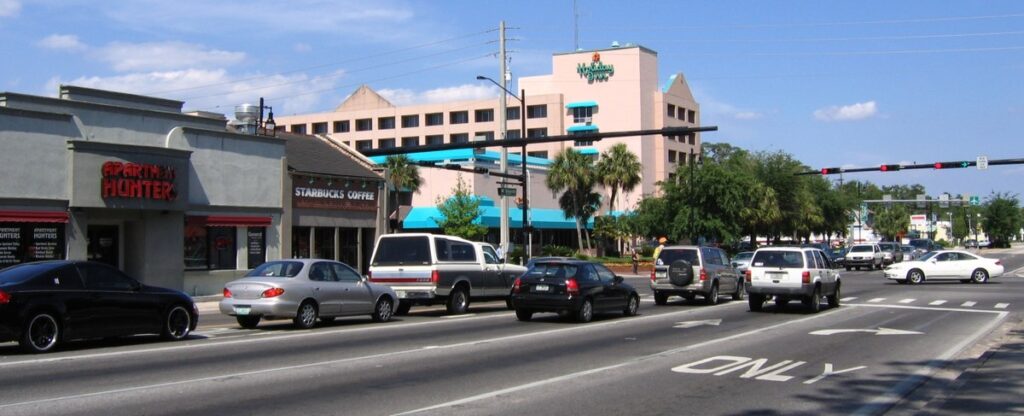
Moving to Gainesville, Florida: A Comprehensive Relocation Guide
Considering moving to Gainesville, Florida? This university city offers academic excellence, cultural vibrancy, and natural beauty. As Alachua County’s seat with approximately 145,000 residents in 2025, Gainesville combines college town energy with healthcare innovation and North-Central Florida character.
Demographic Profile to Consider If Moving to Gainesville:
Gainesville’s 2025 population is approximately 145,000 residents, with the University of Florida’s 50,000+ students significantly influencing community character. The median age is around 27 years, reflecting the large student population. The permanent population is approximately 62% White, 20% Black or African American, 11% Hispanic, and 7% Asian. Gainesville features distinct neighborhoods from university-adjacent areas to historic districts like Duckpond and suburban developments. The University of Florida dominates the city’s identity, creating an academic atmosphere with research innovation, cultural venues, and college sports passion. The community attracts diverse residents including students, faculty, healthcare professionals, and families seeking education quality. Gainesville balances youthful energy with established residential areas. Find trusted local services for moving, living, and working in Gainesville.Gainesville Relocation Directory
Cost of Living to Consider If Moving to Gainesville:
Gainesville offers moderate costs for a university city and Florida metro. Median home values range from $280,000 to $360,000 in 2025, with historic neighborhoods and areas near campus commanding premiums. The median household income is approximately $52,000, though this reflects the large student population. Rental properties average $1,400 to $1,900 monthly, with student-oriented apartments affecting the market. Florida’s absence of state income tax benefits residents. Overall cost of living is reasonable for Florida, though university influence creates competitive rental markets. Gainesville provides value compared to South Florida while offering cultural amenities and employment opportunities. Housing costs vary significantly from student areas to family neighborhoods.
Economy and Job Market:
Gainesville’s economy centers on the University of Florida, healthcare, and technology. UF is the largest employer with over 30,000 jobs across academic, research, and administrative sectors. UF Health Shands Hospital is a major academic medical center and trauma facility. North Florida Regional Medical Center provides additional healthcare employment. The university’s research parks attract technology companies and startups in biotech, engineering, and innovation sectors. Alachua County government and school district employ area residents. Retail and service sectors support the student population. The Innovation Hub and Sid Martin Biotechnology Institute foster entrepreneurship. Professional services including law, accounting, and consulting serve the region. The university’s presence creates stable economic foundation with research and innovation driving growth. Many residents work in education, healthcare, research, and technology.
Education:
Alachua County Public Schools serves Gainesville students with numerous schools including Gainesville High School, Buchholz High School, and various elementary and middle schools. The district offers magnet programs and International Baccalaureate options. The University of Florida is a top-ranked public research university offering comprehensive programs and attracting students globally. Santa Fe College provides associate degrees and workforce training. The concentration of educational excellence creates competitive academic environment. Many families relocate to Gainesville for educational opportunities. The university’s presence ensures abundant educational resources and cultural programming accessible to the community.
Recreation and Lifestyle:
Gainesville offers exceptional recreational and cultural amenities driven by university presence. Florida Gators athletics, especially football at Ben Hill Griffin Stadium and basketball at Exactech Arena, create community passion and entertainment. The university’s cultural venues include Harn Museum of Art, Florida Museum of Natural History, and performing arts programs. Devil’s Millhopper Geological State Park showcases a massive limestone sinkhole with observation platforms. Paynes Prairie Preserve State Park offers wildlife viewing, hiking, and scenic vistas. Numerous springs including Ginnie Springs and Ichetucknee Springs provide swimming and tubing nearby. The city maintains extensive park systems and nature trails. Downtown Gainesville features restaurants, bars, live music venues, and independent shops. The vibrant music scene has launched numerous bands. Depot Park and Depot Avenue create entertainment districts. The subtropical climate with four mild seasons enables year-round outdoor activities.
Healthcare and Services:
Gainesville residents access world-class healthcare through UF Health Shands Hospital, a Level I trauma center and academic medical center providing comprehensive services and specialized care. North Florida Regional Medical Center offers additional full-service hospital care. The VA Medical Center serves veterans. Numerous medical offices and specialty practices operate throughout the city. The concentration of medical education and research ensures cutting-edge healthcare access. Gainesville serves as a regional medical hub for North Florida.
Transportation:
Gainesville benefits from Interstate 75 running through the western edge, and U.S. Highway 441 as a primary corridor. Gainesville Regional Airport provides limited commercial flights, with Orlando and Jacksonville airports offering more extensive service within 90 minutes. Regional Transit System (RTS) operates extensive bus routes throughout Gainesville, with student ridership creating robust service. The university area offers walkability and bicycle infrastructure. Most permanent residents use personal vehicles, though the university community supports alternative transportation. Typical commute times are short given the city’s size.
Conclusion:
Moving to Gainesville in 2025 offers college town vibrancy with top-ranked university, cultural richness, and natural beauty. The city’s combination of academic excellence, Gators athletics, healthcare innovation, and North Florida springs makes it ideal for students, faculty, professionals, and families seeking university community character with quality of life.

